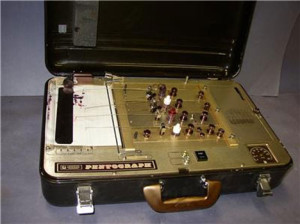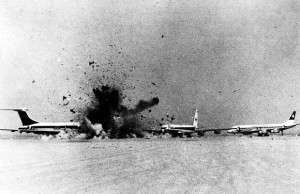by Alan Trabue
Chapter 1: Ready Aim…. Part 1
The day was supposed to be a routine travel day between CIA offices, a simple one-hour flight from the international airport in a Southeast Asian capital city to another city up-country. It was 1976, and as a CIA covert ops polygraph examiner, I had made hundreds of similar trips in the past without incident. By mid-morning, it had gone terribly wrong.
The day started off as planned. After an hour-long taxi ride to the airport, I checked in at the airline counter and made my way to the departure lounge carrying my briefcase. I didn’t normally carry my briefcase, because it really wasn’t a briefcase. It was a polygraph instrument built into a briefcase. A casual observer would never know what was inside. Up to that point, my day had gone as expected. I busied myself people-watching in the departure lounge while waiting for the boarding announcement. However, as I watched with disbelieving eyes, soldiers entered the lounge carrying two things that made my heart sink: sub-machine guns and a table. Terrifying visions of being handcuffed and carried off to jail by armed soldiers filled my mind. I knew my polygraph instrument was very incriminating evidence of espionage, and I didn’t have any credentials that would protect me.
The table was set up near the exit door and an announcement followed that passengers would have to submit to a bag search before boarding the airplane. I couldn’t believe my bad luck. Should I try to escape by leaving the departure lounge or would that raise their suspicions? T at course of action seemed uncomfortably similar to a car approaching a roadblock and turning around to avoid the police. That never has a good outcome. Should I try to bluster my way through as a pompous, overbearing, ugly American? Should I refuse to open my briefcase?
All options seemed to lead to the same disastrous conclusion. I decided to cooperate as best I could.

Realizing the uproar that would surely ensue when I opened the briefcase, I thought it best to be the last one in line. I wanted as small an audience as possible. So, while other passengers rushed to form some semblance of a line, I hung back and waited. My mind raced, but I was unable to figure out how to escape the terrible predicament. I had no choice but to comply with the security check. One by one, the passengers were screened and allowed to walk out onto the tarmac to climb the steps to the airplane. When I was the last passenger in the departure lounge, I could wait no longer. Walking up to the flimsy table, I put the heavy briefcase down. It caught the immediate attention of a soldier. He motioned for me to open the case. I unsnapped the latches holding the lid closed and spread the briefcase wide open. Looking down, he gasped for air, stepped back, and tightened his grip on the sub-machine gun. Pointing it straight at my chest, he screamed for help. Terrified, he gripped his weapon so tightly his knuckles turned white. Beads of sweat dotted his forehead and fear widened his eyes. He was one finger twitch away from cutting me in half.
A mere twenty-four hours before, I had taken every step to ensure that this very event would not take place. This was not supposed to be happening. The main office had an urgent need to have an agent polygraphed at one of its smaller offices up-country. Since there was no polygraph instrument stored at the office and insufficient time to send one through official channels, I knew I would have to take an instrument with me on the flight. In the 1970’s, a rash of airplane hijackings resulted in passenger and baggage security checks at many international airports. At first, they concentrated on international flights. Few airports were performing security checks on domestic flights. Since my flight was going to be a short domestic flight, I knew that I could either hand-carry the polygraph instrument on the airplane or pack it in a larger suitcase and send it through as checked baggage. Everything depended on whether the airport had instituted security checks for domestic flights.

“What’s the security check situation at the airport?” I asked the case officer.
“There is no security check on domestic flights, only on international flights,” he responded with what seemed like a great deal of confidence.
Realizing that I would be in a significant amount of trouble if the polygraph instrument was opened and inspected by security personnel, I wanted to have as much confidence in his answer as he did. After all, an analog polygraph instrument with all its knobs and dials might look like a bomb to an unsophisticated security guard. On the other hand, a more sophisticated security guard might recognize it as a polygraph instrument and wonder what I was doing with spy equipment.
“Hey, I don’t feel very comfortable hand-carrying the instrument on an airplane. It’s not that I’m unwilling, but this could be dangerous. Can you imagine the commotion it would cause if the briefcase was opened?”
He told me not to worry, but his feeble attempt to reassure me was not very convincing.
Noticing that I still seemed worried, he said, “Alan, relax. I’ll check with ‘our man’ at the airport. He’ll have the skinny on the most up-to-date policies and procedures.”
He made the call (at least, he said he made the call) and reported to me later in the day that “our man” at the airport confirmed that security checks were only performed on international flights. I thanked him for the extra effort he took to ease my concerns. With this new information, I decided it would be easiest for me to just hand-carry the polygraph instrument on the flight.
Life of a CIA Polygrapher will continues here in part 2.
A second generation CIA officer, Alan B. Trabue spent his youth in Uruguay, Japan, and Saipan. He traveled extensively in Central America, South America, the Far East, Southeast Asia and Europe interrogating foreign spies. For five years, he directed the CIA’s world-wide covert ops polygraph program. He served as Director of the CIA Polygraph School for six years and as an adjunct instructor at the current federal polygraph school for eight years. He is also the author of A Life of Lies and Spies: Tales of a CIA Covert Ops Polygraph Interrogator
“For a cumulative record of service which reflected exceptional achievements that substantially contributed to the mission of the Agency,” Mr. Trabue received the Career Intelligence Medal.
